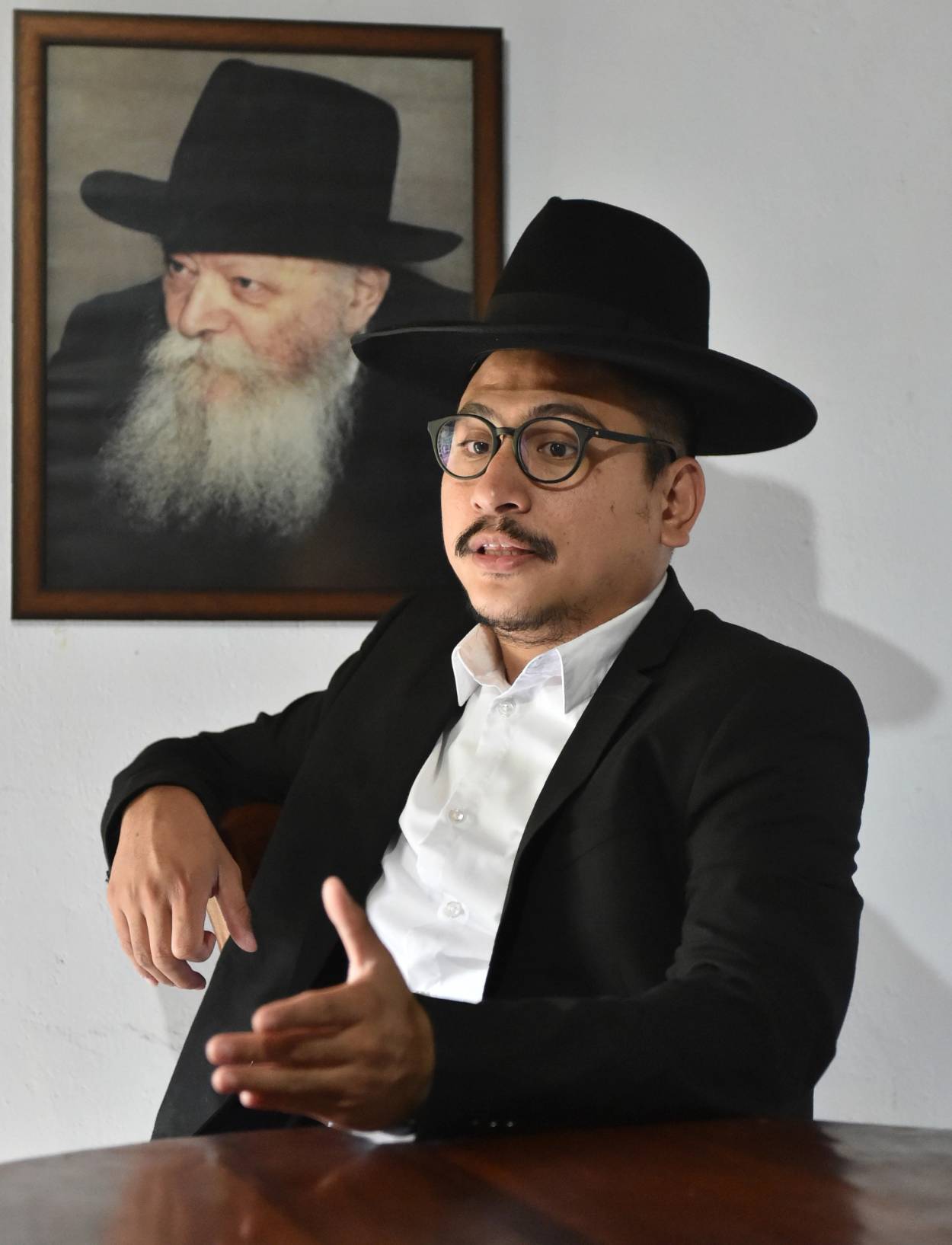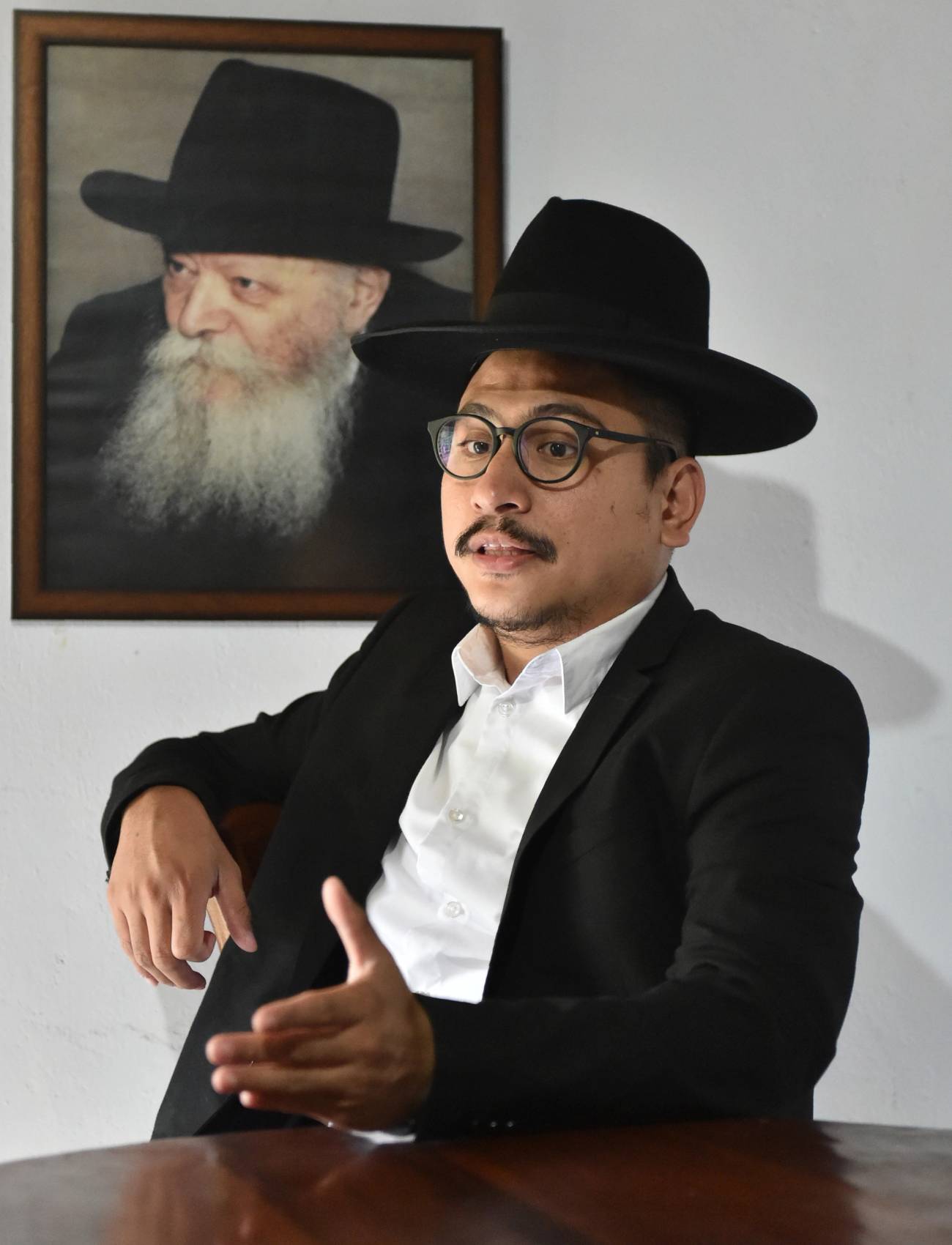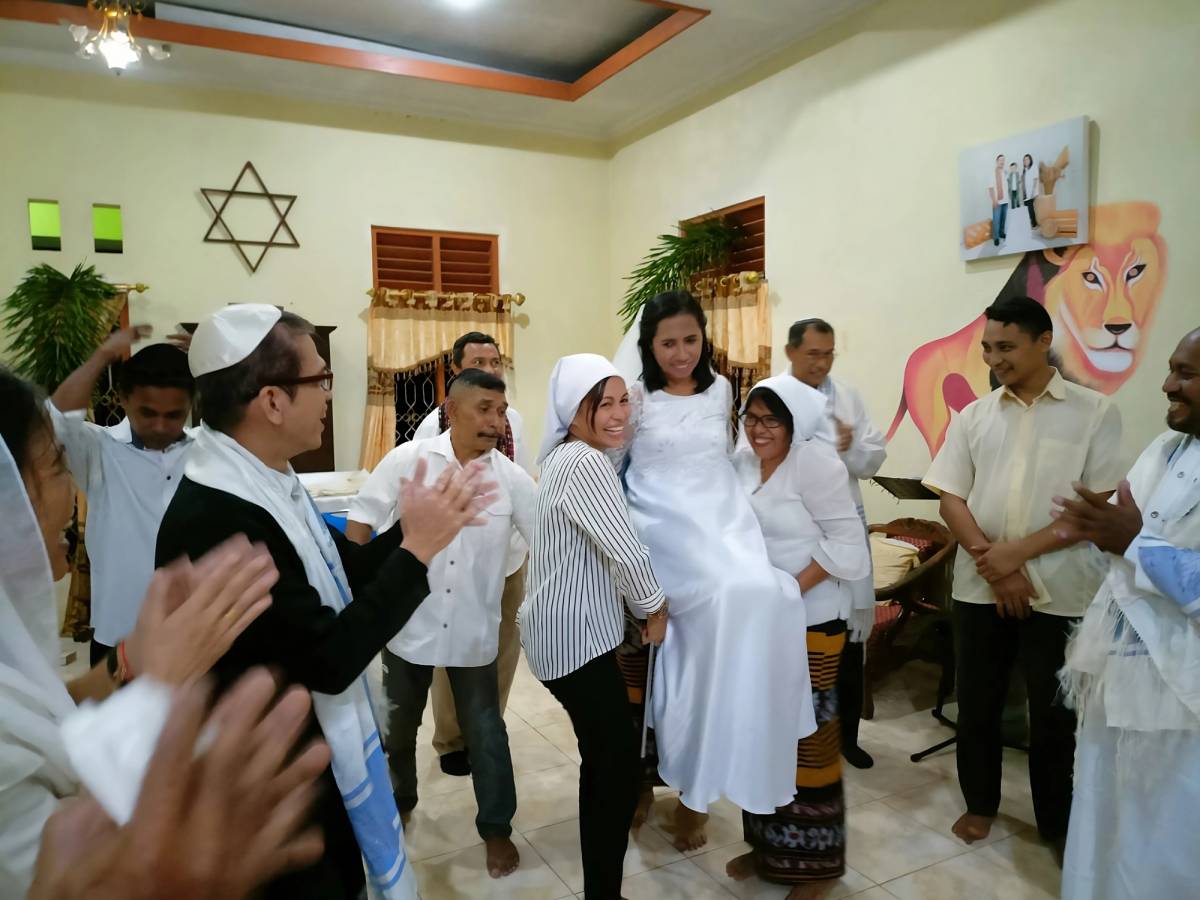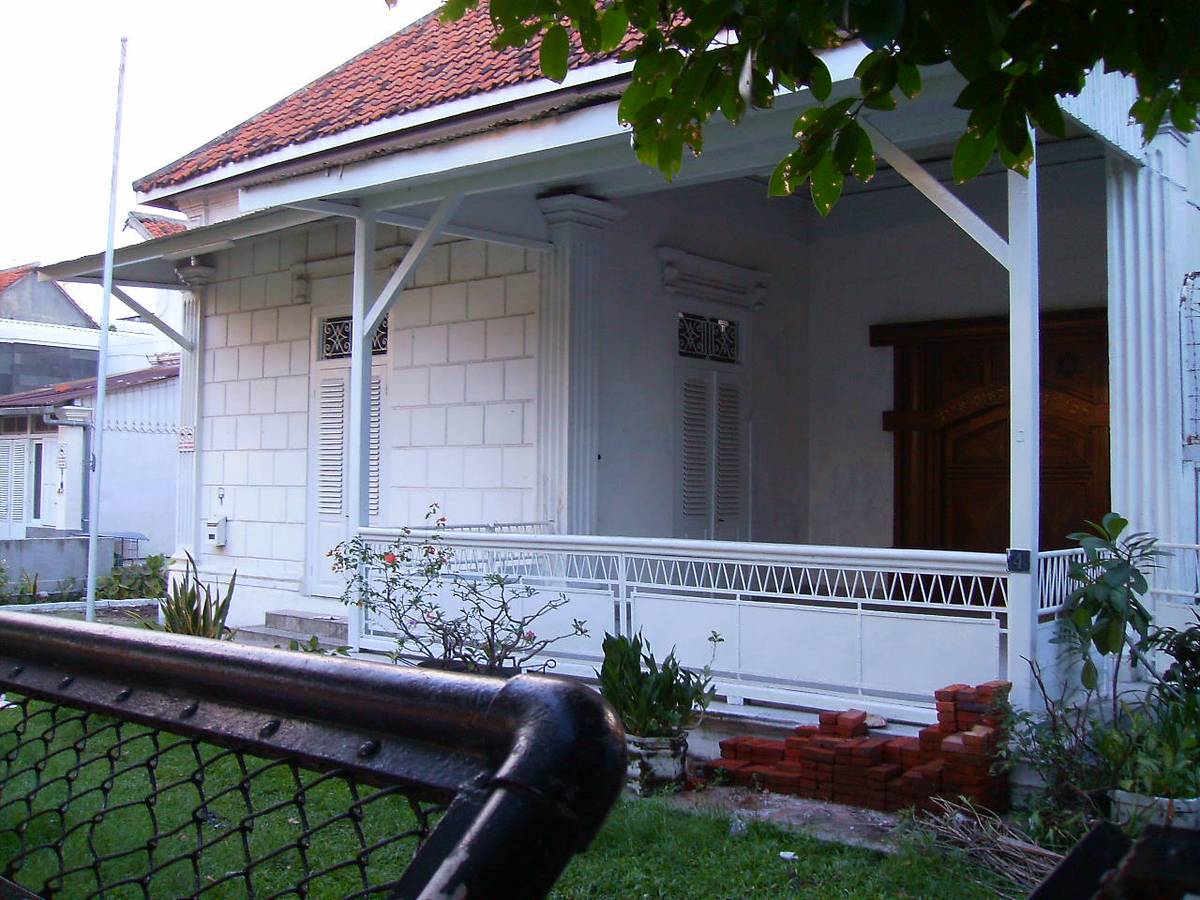Indonesia’s Jews Come Out
In the world’s most populous Muslim country, a new generation of Jews strives for visibility




“I feel I have a duty to represent the Jewish community—and other religious minorities, too,” said Ezra Abraham, a 29-year-old resident of Cirebon, West Java, in Indonesia. He is part of a new generation of young Indonesian Jews whose visibility is growing. “The time is now,” he said. “If not us, then who?”
Indonesia, the world’s most populous Muslim-majority nation, is currently home to around 500 Jews, out of a population of over 275 million. But as Indonesians of Jewish ancestry have started to publicly reclaim their heritage over the past two decades, the community is thriving like never before.
Rabbi Benjamin Meijer-Verbrugge leads the United Jewish Indonesian Community, a nondenominational group with 180 registered members across the country; while he identifies as Ashkenazi and Orthodox, his organization is open to all traditions within Judaism. “We have also had several conversions,” he said, “mainly from Christians.”
Abraham belongs to the Sephardic branch of Indonesian Jewry, one with a history stretching back to the Iraqi Jews who arrived in what was then known as the Dutch East Indies in the late 1800s or early 1900s. Led by Emma Mizrahie, these Iraqi Jews joined Surabaya’s existing Jewish community—made up of Jews from Dutch, German, Portuguese, Spanish, and Polish backgrounds—under the leadership of Izaak Ehrenpreis and Rechte Grunfeld. The community registered with the colonial government under the name of Israelitische Gemeente van Soerabaia (the city’s old spelling), East Java, and went on to build the first synagogue in the city in 1923: Beth Shalom, which gradually went into decline after WWII. The communal organization was resurrected in the early 2000s some 1,000 miles away in Tondano, North Sulawesi, under the name Shaar Hashamayim Indonesia (Israelitische Gemeente Indonesie in Dutch), and now runs the only legally recognized synagogue in the country: Kahal Kadosh Shaar Hashamayim, which follows the Portuguese and Spanish rites under the supervision of Rabbi Yaakov Baruch.
Abraham, however, lives more than 1,200 miles from Tondano in Cirebon, a city of around 340,000 on the northern coast of West Java. Starting out as a fishing village in the 15th century, it soon became the seat of power for the Sultanate of Cirebon, from whose lineage Abraham’s mother is descended. A port city in the old days, Cirebon attracted multiethnic settlers to its shores, including Jews, Chinese, and Arabs.
Abraham was born out of a union between his Jewish father and Muslim mother. After being raised Muslim, he decided to convert to Reform Judaism in 2012. Three years ago, he returned to the Sephardic roots of his father’s ancestors, who had immigrated to Indonesia in the early 1900s.
“Life would probably be easier if I had chosen to remain a Muslim after my mother, but the ancestral calling was stronger,” he said, chuckling. His father, Frederick Ludwijk Patty, is still alive but is an agnostic. Both his parents approved of his decision to convert. Abraham now has siblings who are Christian and Muslim; it’s a multifaith family, he said.
Abraham and one other friend who also discovered his Jewish roots are the only Jews in their hometown. Abraham now meets up with his Sephardic brethren in Tondano and Jakarta—130 miles from Cirebon—for communal worship whenever possible.
An avid activist for religious pluralism, Abraham has for the past few years appeared on talk shows and podcasts to represent Jewish Indonesians—something that was unthinkable until recently. “When I was about to go on a talk show hosted by a Muslim cleric for the first time, many of the old [Jewish] folk here tried to talk me out of it, saying it was risky,” he said.

Caution, he said, was the principle older generations of Indonesian Jews lived by. Abraham said, given their past trauma, he could understand why so many of his predecessors chose to keep their Jewish identities secret.
Most Jews in Indonesia are descended from the thousands of Ashkenazi Dutch Jews and other Europeans who migrated in the early 19th century and subsequently intermarried with the non-Jewish local population; others trace their Sephardic roots to immigration from Iraq and elsewhere. Today, however, almost all Indonesian Jews were born and raised in the country.
Abraham’s father was born here. So was Meijer-Verbrugge’s father. But they were raised in a time when Indonesian Jews had to hide their identity.
After invading the Dutch East Indies in 1942, the Japanese interned more than half of the local Jewish population of around 3,000, classifying them as Dutch combatants. Things turned worse the following year when non-Dutch Jews were detained and subsequently forced to work in labor camps. Those who managed to evade arrest fled overseas or obscured their Jewish identity by converting to other faiths.
“My grandmother, Miriam Frieda, who grew up during WWII, had to hide her Jewish identity for fear of being arrested by the Japanese,” said Abraham. “She did this by converting to Roman Catholicism. But my grandmother never made it a secret within the family that we had Jewish blood.”
After WWII, when most Jews were interned or fled, those who came back found that their properties, like all those belonging to the Dutch, had been seized by Indonesians. Most decided to leave the country for other Jewish communities in Southeast Asia, notably Singapore, or start over in Israel. The remaining Indonesian Jews have had a low-profile existence since then, subsisting as a hidden subculture of secret heritage and public conformity.
Today’s Jewish community is largely made of native-born Indonesians like Abraham who have begun to reclaim their Jewish identity. No longer feeling they need to live double lives, more Indonesian Jews are now open about their faith in their daily lives, and more importantly, on social media, where more than 60% of Indonesians interact with one another.
The internet had helped usher in a new age for Judaism in Indonesia, said Avshalom Benayahu, who lives in Manado, North Sulawesi, about 20 miles from the synagogue in Tondano. Being online helps Indonesian Jews, who are scattered across the archipelago, to connect with each other. In celebrating Purim recently, for instance, different small communities in various cities held their own rituals but came together online via Zoom.
“Like most Jews here, my family also converted to another faith to avoid stigma,” he said. “I was raised as a Christian, like most Manadonese.”
But growing up, the 42-year-old heard stories from older family members that he was Jewish. Retracing the family ancestry in the early 2000s, they constructed a family tree and managed to identify their Jewish ancestors and established their Jewishness beyond doubt. Benayahu converted to Orthodox Judaism in 2009 and is currently training to be a rabbi under Meijer-Verbrugge.
“Before my conversion, I felt isolated and alone in Manado,” he said. “Thankfully, social media provided me with a means of reaching out to other Indonesian Jews, which is how I first made contact with Rabbi Benny [Meijer-Verbrugge].”
Meijer-Verbrugge, 52, was born and raised a Muslim in Jakarta to a Jewish mother and Javanese Muslim father. In his adult years, he decided to become a Christian before converting to Reform–Conservative Judaism in 2011 and Orthodox Judaism in 2021 following the death of his German Jewish maternal grandfather, Benjamin Verbrugge, who died in 2003. “My grandfather charged me with the duty of reviving my Jewish heritage,” he said. “This was his final wish.”
The senior Verbrugge had played an important role in his grandson’s discovery of his Jewish identity from an early age. “When I was 5,” he said, “he used to gather his grandchildren around him to tell us we were Jewish.”
The Indonesian state only recognizes six religions; Islam, Roman Catholicism, Protestantism, Buddhism, Hinduism, and Confucianism. The freedom to adhere to other faiths is guaranteed by the constitution, although discriminative practices against minority faiths—in job promotion among civil servants, school dress code for non-Muslims, and, in extreme cases, forced evictions from homes—are common.
The rabbi pointed out it’s still impossible for an Indonesian Jew to have his or her faith listed on the mandatory National ID Card, called a KTP: “As things stand, even if you have all the proof that you practice Judaism, you will get put under ‘other faiths in God’ category.”
Meijer-Verbrugge said that despite the growing visibility of Jews in Indonesia, prejudice and stigma still exist. Hostility comes largely from the country’s Muslims, most of whom grew up with the notion of Jewish people as enemies of their religion. A public poll carried out in May 2022 by Saiful Mujani Research and Consulting found 51% of Indonesian Muslims had serious misgivings about having Jewish neighbors, 57% opposed having Jews teach at public schools, and 61% objected to Jews becoming government officials.

Abraham said, however, he had never experienced extreme prejudice living in a Muslim-majority city: “Part of the problem is that the decadeslong invisibility of the Jewish people has made us into the convenient, never-seen bogeyman,” he said, stressing that greater engagement outside the faith will help dispel the prevalent misconception and disinformation about Jews. “At past interfaith events, Muslim participants were initially uncomfortable when I told them I was Jewish. But by the end of our frank discussions, most would’ve modified their stance.”
He said putting real faces to Judaism in Indonesia makes it far less surreal, adding some of his biggest supporters in the interfaith community used to be skeptical of Judaism.
Aan Anshori, a Muslim cleric and pluralism activist working in Indonesia’s largest Islamic organization, the Nadhatul Ulema, described the antipathy toward Jews among Muslims in the country as “culturally deep-seated.”
Anshori said most Indonesian Muslims grew up hearing the story of how the Prophet Muhammad died after being given poisoned food by a Jewish woman. He added that the issue of Palestinian independence has given a modern-day context through which Indonesians see the Jewish people as villains. In 2013, for instance, following protests by Islamic groups over the Israel-Palestine conflict, Surabaya’s Dutch-era synagogue was sold to a developer and razed to the ground, despite being previously declared a heritage site.
“The key to turning this around is to instill the importance for coexistence between Islam and other faiths today,” Anshori said passionately.
The Rev. Irma Simanjutak, a Christian pastor and activist for religious pluralism, is also a firm believer in dialogue between all faiths. The last week of January, she attended the Jewish-Christian-Muslim Conference in Manado. The Shaar Hashamayim synagogue hosted the interfaith meet-up, which also commemorated International Holocaust Remembrance Day.
“What struck me most about the conference was the informal and relaxed atmosphere,” Simanjutak recalled. “Muslims and Christians had been having a dialogue in Indonesia for a long time and it was refreshing to have our Jewish brethren present for the last three years.”
North Sulawesi, a Christian-majority part of Indonesia, remains the only region to have allowed the construction of a new synagogue. Simanjutak believes there is a lot of goodwill among Indonesian Christians—who make up about 10% of the country’s population—toward Judaism, many of whom see it as the precursor to their faith. She said that when she spoke to Christians in Manado, the capital city of North Sulawesi, they kept referring to Tondano’s Shaar Hashamayim synagogue as “gereja Yahudi,” or Jewish church.
Shaar Hashamayim’s Rabbi Baruch, a 40-year-old native of North Sulawesi who grew up in a Christian family in Manado, said establishing rapport with other faiths in Indonesia sends a clear message that Judaism is a religion of peace. “It also signifies to the other faiths that we are a people open to all,” he said. “By taking part, we are being included in the conversation between religions at the national level.”
Meijer-Verbrugge, though he remains optimistic about the future, said that Indonesian Jews have a number of challenges stacked against them, both internal and external. “Our small number means coordination and communal events are more difficult and expensive to organize,” he said. Not all Indonesian Jews are high-income earners, he added; many earn the minimum wage, around US$132 to $333 a month. “This means many can’t afford memberships in international Jewish organizations or travel to meet with their brethren overseas.”
Another challenge is more fundamental, he said: “It’s still very difficult for us here to find life partners who are also Jewish. The implications are obvious for the next generation.”
Abraham said he has ruled out marrying outside the faith. “Fortunately,” he said, “my girlfriend is willing to convert” to Judaism.
Baruch, however, has some sobering advice for his fellow Indonesian Jews, saying the greatest enemy often comes from within. He gave an example of how new converts to Judaism openly disparaged their former faiths on social media. “It falls on the leaders of our community to rein in such fanaticism,” he said, “because we want Indonesian Judaism to be an inclusive faith.”
Johannes Nugroho is a journalist based in Surabaya, Indonesia. Follow him on Twitter @Johannes_nos